Trending Now
We have updated our Privacy Policy and Terms of Use for Eurasia Group and its affiliates, including GZERO Media, to clarify the types of data we collect, how we collect it, how we use data and with whom we share data. By using our website you consent to our Terms and Conditions and Privacy Policy, including the transfer of your personal data to the United States from your country of residence, and our use of cookies described in our Cookie Policy.
{{ subpage.title }}
Multinational corporations aren't about to give up on global business
An op-ed in the Financial Times argues that the era of borderless enterprise may be past, thanks to rising geopolitical tensions between the US and China. In "Geopolitics spells the demise of the global chief executive," Elisabeth Braw writes that the nationalities of companies and their chief executives now matter again and their ability to pursue a truly global business strategy will be limited. But has the situation actually changed? Ian Bremmer and Eurasia Group analyst Charles Dunst take out the Red Pen to explain that nationalities have always mattered, and many of these risks aren't new.
Today we are talking about the impact that increasing geopolitical tensions could have on big, multinational corporations. In a recent op-ed for the Financial Times, Elisabeth Braw of the American Enterprise Institute, AEI, argues that we could be entering a distinctly new chapter in global business, one in which where a company comes from matters much more. In other words, a move away from borderless companies and toward nationalism.
She cites CEOs like Ramon Laguarta of Pepsi and Satya Nadella of Microsoft, both foreign-born executives leading American companies, as a positive trend of globalization that may come to an end in the current political reality.
It's an extremely interesting and provocative piece. You should definitely read it.
We are not convinced. Let's get out the Red Pen.
First, Braw writes that "the era of borderless enterprise may be past" and argues that "suddenly companies', and executives', nationalities matter again."
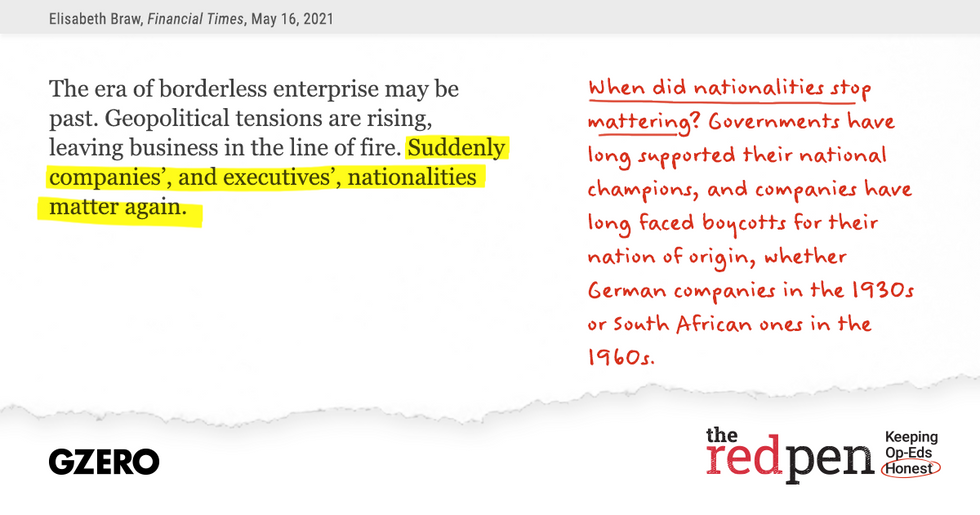
So question, when did nationalities stop mattering? Governments have long supported their national champions. In the wake of the 2008-09 financial crisis, the German government spent 1.5 billion euros to bail out their auto industry. BMW, for one, might have had non-German higher ups, but when the rubber met the road, it mattered the most was that BMW was a German company. The era of the globalization never meant an end to national pride or responsibility when things got tough.
Secondly, the number of foreign CEOs of Global Fortune 500 companies has remained pretty constant since the 2008 financial crisis. I'd also point out that as of 2019, the last date we could find good numbers for, 45% of the companies on that list were founded by immigrants or the children of immigrants. No real change.
Next, Braw suggests that Western corporate titans may now conclude that the companies they run "should be loyal not just to their shareholders but to the company's home country if it provides democracy, rule of law and a safe business environment."
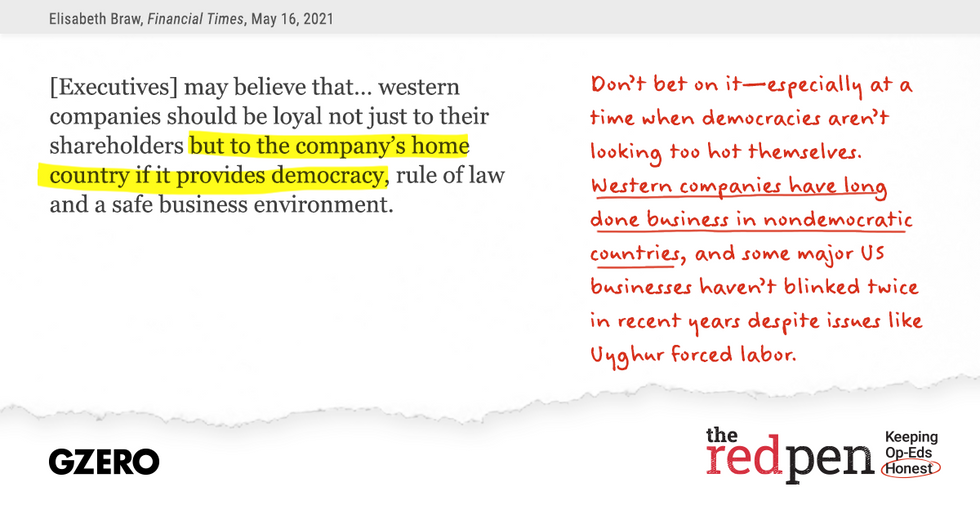
I'm not ready to bet on that. Western companies have long done business in nondemocratic countries, and some major US businesses haven't blinked twice in recent years even on issues like Uighur forced labor. In fact, China overtook the United States last year as the top recipient of new foreign direct investment. Goldman Sachs just announced an expansion of its staff there by 2024. Amazon, Apple, Nike, Gap…the list goes on. Still doing business and expecting growth in China.
Finally, Braw writes that "executives may consider themselves citizens of nowhere, but a business can be harmed because of where it is based."
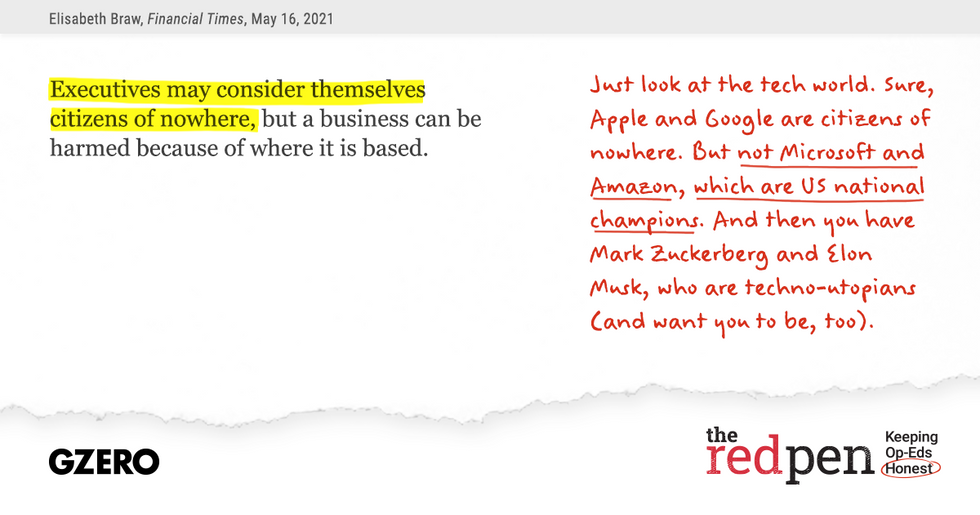
That's true. But is that risk new? There were boycotts of German companies in the 1930s, of course, and the same in South Africa during Apartheid in the 1960s.
Yes, Apple and Google are enthusiastic citizens of nowhere. But not so much for Microsoft and Amazon, which are increasingly US national champions.
In conclusion, do rising tensions between, say, the United States and China mean that a new era of business with borders is on the horizon? A Standard Chartered report, just from a couple of months ago, back in March found that of multinational corporations based in the United States, the United Kingdom, France, and Germany, 42% "see their best growth opportunities outside of their home market." That's actually "5% higher than six months ago."
So…no.
Putin's next move won't be a Baltic invasion that could unify NATO
Russian President Vladimir Putin needs a way to boost his popularity at home, but is he likely to launch a military campaign targeting the Baltic states, as Russian studies expert Leon Aron argues in a recent Politico op-ed? Ian Bremmer and Eurasia Group analysts Alex Brideau and Zachary Witlin take out the Red Pen to break down why a Baltic invasion is unlikely to be on Putin's agenda.
Today we're taking a look at a recent op-ed from Politico, penned by Russian studies scholar Leon Aron of AEI.
And the title asks a provocative question, "Could Putin launch another invasion?" Aron links the current political moment in Russia, big protests, struggling economy, and Putin's own thirst for power and popularity, with the factors that led to Russia's incursion into Ukraine and annexation of Crimea in 2014. He lays out the possibility that Russia could make military moves yet again, potentially against Estonia, Latvia, or Lithuania, the three Baltic states that all happen to be members of both the European Union and NATO.
Some context: This has been quite a week for US/Russia relations. President Biden in an interview with ABC News agreed with an assertion that Vladimir Putin is a "killer," I think he called him "soulless," too. And Russia responded by recalling their ambassador to the United States. All this comes as the American intelligence community released a report this week claiming that Russia had launched yet another campaign in the 2020 election to undermine Biden.
So a logical question would be: What is Putin's next move? Could he wage yet another military campaign?
Now, as with many of the pieces that we look at, some points Aron makes are right on the money. Yes, Putin did gain a lot of popularity after the operation in Crimea, especially. And yes, NATO faces real issues; Turkey is barely an ally these days, countries are slow rolling in terms of spending cash that they're promised, the French are talking about strategic autonomy, and yes, Putin always seems to have a surprise or two up his sleeve. But we are completely not convinced by the argument that an invasion of the Balts may be on its way.
So let's take out the Red Pen.
First, Aron writes that Putin's interventions, especially in Ukraine "worked," driving a "Crimean consensus" that victory in war overshadows troubles at home.
Sure, the Crimea intervention "worked" for Putin. Until it didn't. Putin has had to downplay military involvement in Ukraine of late to avoid a backlash from a Russian public that cares primarily about domestic issues still, like pensions, for example. And let's not forget that getting involved in Libya, in Syria, even in Nagorno-Karabakh didn't yield any real popularity bump of note for Putin.
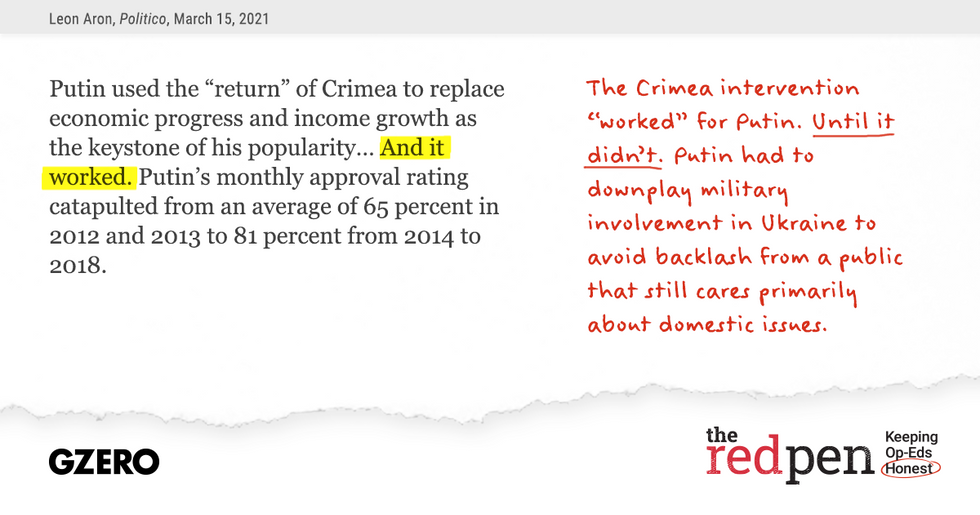
Next, Aron writes that "we tend to repeat what worked." That is, Putin reached for the military lever before when he faced trouble, so he might do so again.
Well, Putin's decision making doesn't occur in a vacuum. Every past intervention was driven by national interest and foreign policy goals. Does Putin care about Putin? Of course. But Putin can't be sure that cooking up a foreign war would help matters it home. In fact, it might actually make them worse.
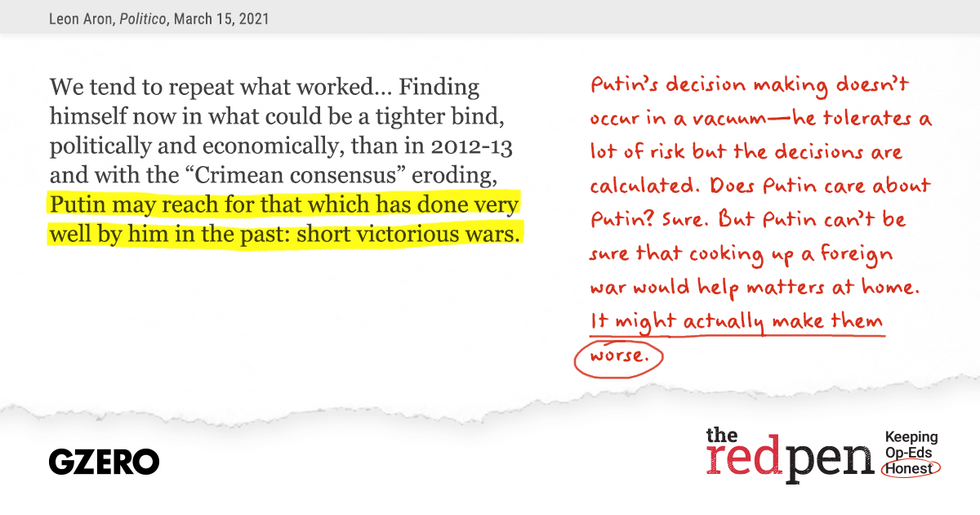
Finally, Aron says that Putin may consider a "fast and victorious poke at NATO's eastern flank," targeting the Baltic states and breaking NATO.
An attack on the Balts may be fast or it may be victorious, but probably not both. And Putin knows this. Western leaders are conflicted about the alliance, but an assault on full-fledged NATO State and EU members is exactly the kind of provocation that could awaken it. Putin understands this. He hardly wants to bring the alliance together as it's eroding. Low-cost efforts to steadily undermine legitimacy and grabbing targets of opportunity when available, that is much more Putin's speed.
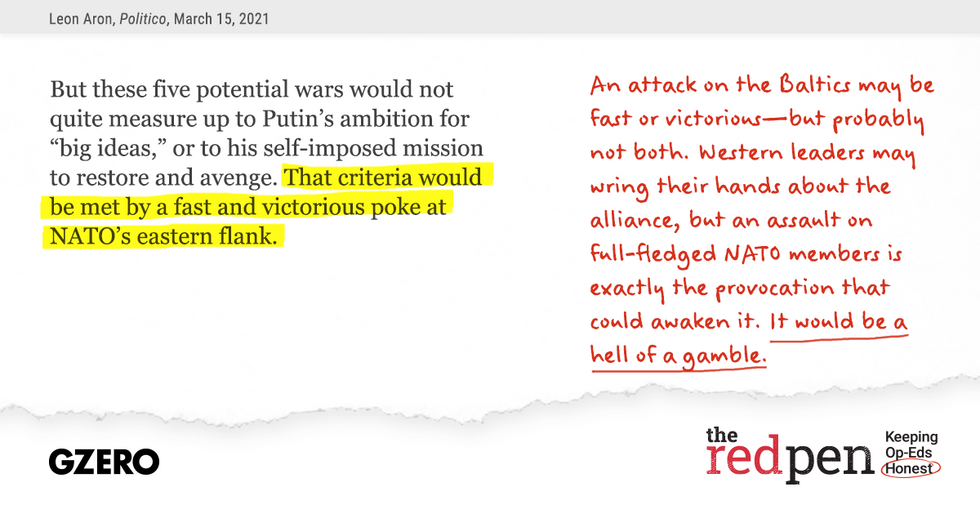
Putin certainly seems to want to be president for life and probably is going to end up running for a fifth term, though a lot can happen in three years. Military moves that diminish his popularity or lead to further widespread protest, never mind bring together his adversaries, that is a strong NYET for now tovarishchey.
- Russian military escalation against Ukraine worries Europe - GZERO Media ›
- Should NATO embrace Ukraine? - GZERO Media ›
- Russian military escalation against Ukraine worries Europe - GZERO Media ›
- Russia will withdraw forces from Ukraine but Putin reveals nothing - GZERO Media ›
- Would China really invade Taiwan? - GZERO Media ›
- Ukraine is fighting for all of us, says Estonia's former president Kersti Kaljulaid - GZERO Media ›
- A Republican Congressman’s take on the "Russia threat” - GZERO Media ›

